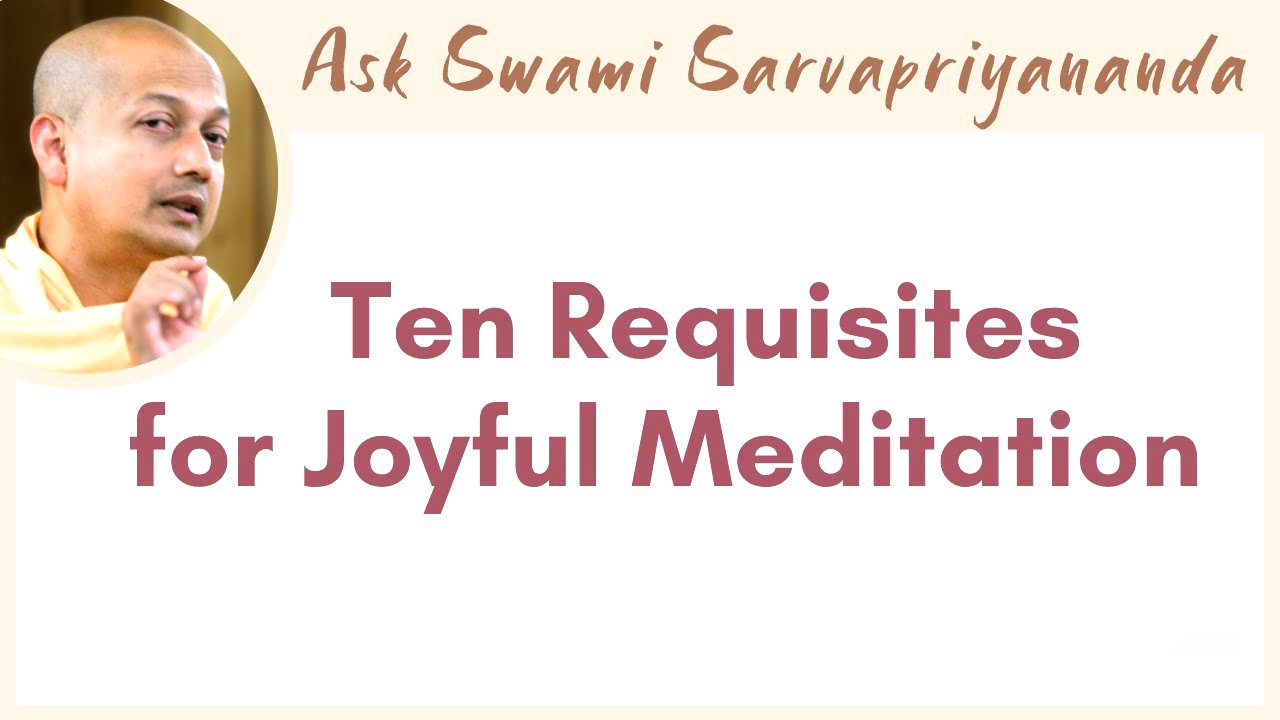TLDR;
This video addresses the question of how to cultivate a desire for meditation and make it a more enjoyable practice. It draws upon the teachings of Sri Ramakrishna and Swami Ashokananda, outlining ten key points to improve meditation. These points include regularity, fixed time and place, cleaning up the mind by starving negativity and feeding positivity, avoiding bad company, practicing asceticism, cultivating quietness and detachment before meditation, and fostering a deep yearning for God.
- Regularity and consistency in meditation practice are crucial.
- Creating a conducive environment and mindset aids in deepening meditation.
- Cleaning up the mind involves replacing negative thoughts with positive influences.
- Yearning for spiritual realization enhances the meditation experience.
Introduction [0:02]
Laura asks how to cultivate the desire to meditate and genuinely enjoy the practice, as meditation feels like a chore despite feeling good afterward. The speaker references Swami Ashokananda's essay "Before You Sit for Meditation" from the book "Meditation According to the Monks of the Ramakrishna Order," recommending it as a valuable guide. The essay provides ten suggestions for improving meditation.
Sri Ramakrishna's Teaching [2:11]
Sri Ramakrishna uses the example of a washerman with a vat of dye to explain how to approach meditation. Swami Ashokananda initially misunderstood this analogy, thinking it applied only to those with pure minds. However, he later realized that it meant even those with "spotted" minds can be "dyed" in the color of God through meditation, making spiritual transformation accessible to everyone.
Regularity and Consistency [3:57]
The first point is regularity: meditating every day, even when one doesn't feel like it, is essential. Giving in to the mind's resistance to meditation is counterproductive. Even a mechanical, quick meditation is beneficial because it prevents surrendering to the mind. Drawing inspiration from Martin Luther, who prioritized prayer even during his busiest times, the speaker emphasizes the importance of making time for meditation, ideally twice a day, morning and evening, or even three times a day as practiced in some ashrams.
Fixed Time [6:18]
The second point is regular time: meditating at a fixed time each day. The body and mind are creatures of habit, and meditating at a consistent time helps the mind quiet down and become more inclined to meditate. Over time, the fixed time itself can trigger a deep meditative state, becoming a valuable asset. The speaker shares anecdotes of senior monks who maintained their meditation practice even in hospitals and ICUs, demonstrating the power of lifelong habit.
Fixed Place [10:01]
The third point is fixed place: designating a specific area for meditation, such as a room or corner, to create a holy space. Over time, this place acquires vibrations that promote serenity, quietness, and inwardness, serving as a retreat for peace.
Cleaning Up the Mind [10:52]
The fourth point involves cleaning up the mind by starving the negative and feeding the positive. Drawing from a Native American story of two wolves, one dark and one of light, the speaker emphasizes the importance of nurturing the good wolf. Instead of directly grappling with negative thoughts and emotions, which can strengthen them, it's better to take an oblique approach by replacing them with positive influences such as devotional music, spiritual lectures, and inspiring life stories. Surrounding oneself with positivity helps weaken the negative and strengthen the positive.
Avoiding Bad Company [14:52]
The fifth point is avoiding bad company, as we are influenced by those we spend time with. It's important to surround oneself with like-minded people or, if that's not possible, with books, movies, and talks that promote spiritual growth. The speaker advises against feeling obligated to maintain social connections that detract from one's spiritual pursuits, emphasizing the importance of prioritizing one's spiritual well-being.
Asceticism [17:28]
The sixth point is asceticism: practicing moderation and stepping back from excessive consumerism and worldly engagements. While occasional indulgences are acceptable, they should not be the focus of life. Reducing involvement in excessive social activities and obligations creates space for meditation and spiritual growth. It's crucial to align one's actions with one's true desires, especially in the pursuit of spirituality.
Quietness and Detachment [19:33]
The seventh and eighth points are cultivating quietness before meditation and approaching meditation with detachment. Avoid intense activity on phones and social media before meditating. During meditation, detach from worldly relations and identities, focusing solely on the connection between oneself and the Lord.
Yearning for God [20:56]
The final points relate to yearning for God, which is essential for spirituality. Even if one doesn't feel a natural yearning, it's possible to simulate it by reading vivid descriptions of saints' longing for God. Experiencing genuine holiness through contact with enlightened individuals can make spirituality real and lead to lasting progress.









